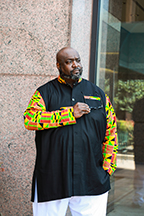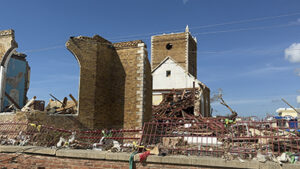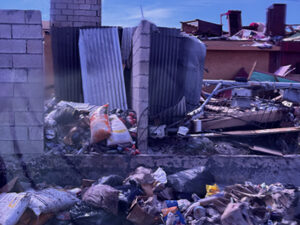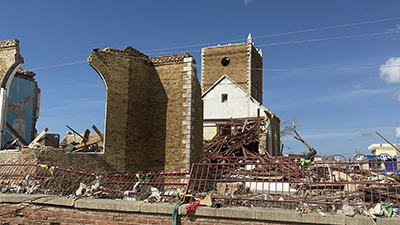By Dr. M. James

I came back to Jamaica two weeks ago with the kind of foolish confidence you earn from distance, the belief that memory alone can protect the places you love. I thought I knew what I was walking into. You see enough disaster clips online, and you tell yourself you understand. I have lived many disaster-type situations trying to be a sojourner of black truth. But the thing about storms is that the camera always misses the part that hurts the most. The quiet. The smell. The stunned way people move, almost zombie-like, after the world rearranges itself. Before all this, my sense of home was stitched into small, ordinary things. Like the shortcut up Park Mountain. That path was never really meant for children, but we took it anyway, barefoot, slipping on mossy stones that had seen centuries of rain. I can still hear Aunt Vera shouting from her veranda, “Mind dat stone by di mango tree!” She said it every time, even when I pretended I didn’t hear her. The air up there always smelled of wet breadfruit leaves and fresh mud, the kind of scent that embodies itself in you whether you want it or not.
As an adult, I traded mountain climbs for early mornings by the Black River shore, a cup of coffee warming my hands while the sea did what it always did, breathed in and out like a calm giant. There was a fisherman in the neighborhood who used to nod at me without saying a word. We had that kind of relationship, mutual acknowledgment, no conversation needed. The beach wasn’t grand, but it was steady. Bottles from the last dancehall party sometimes scatter the beach, which fishermen use the next morning for fishing floats for crab traps. Reliable. Familiar. It was the kind of place you grow into without realizing it.
And then Melissa came.
 When I walked back to that beach, or the place where the beach used to be, I didn’t recognize it at first. The sand was gone, all of it. The sea had eaten it clean away, leaving behind these enormous gray rocks that looked as if they had been dragged out of some ancient riverbed. Nothing about them belonged to the Jamaica I knew. They felt like a warning or a confession, I still can’t decide which. Black River itself… I don’t have a word big enough. The town looked like it had been caught midbreath when the storm hit and never exhaled. Homes bent at strange angles. Streets cracked open like split fruit. And the hospital, the old, stubborn Black River Hospital that had patched up half the parish for generations, just stood there, hollowed out and embarrassed, as a proud elder brought suddenly to weakness. People moved through the rubble with a kind of slowness I’d never seen before. Not laziness. Not shock, even. Something else. A searching. A gathering of the pieces left behind. I watched a man pick up a child’s shoe, too small to belong to anyone nearby, and turn it over in his hands as if it might still be warm. A woman washed mud off a single plate as though the act itself might keep her sane.
When I walked back to that beach, or the place where the beach used to be, I didn’t recognize it at first. The sand was gone, all of it. The sea had eaten it clean away, leaving behind these enormous gray rocks that looked as if they had been dragged out of some ancient riverbed. Nothing about them belonged to the Jamaica I knew. They felt like a warning or a confession, I still can’t decide which. Black River itself… I don’t have a word big enough. The town looked like it had been caught midbreath when the storm hit and never exhaled. Homes bent at strange angles. Streets cracked open like split fruit. And the hospital, the old, stubborn Black River Hospital that had patched up half the parish for generations, just stood there, hollowed out and embarrassed, as a proud elder brought suddenly to weakness. People moved through the rubble with a kind of slowness I’d never seen before. Not laziness. Not shock, even. Something else. A searching. A gathering of the pieces left behind. I watched a man pick up a child’s shoe, too small to belong to anyone nearby, and turn it over in his hands as if it might still be warm. A woman washed mud off a single plate as though the act itself might keep her sane.
Nothing on TikTok prepared me for that. For the way grief makes a town quiet. For how quickly familiarity can fall apart. For how fast the land can forget its own shape. The shortcut up Park Mountain is still there, but it feels different now, as if the earth itself clenched during the storm and hasn’t relaxed since.
And yet, and I almost hate admitting this, there was something alive underneath all that ruin. Not hope, not precisely. More like… insistence. A kind of stubbornness that Jamaicans are born with, the kind that makes people laugh even when their house is missing a wall. The kind that turns a tarp into a roof because tomorrow still needs living.
 Storms take what they want. They always have.
Storms take what they want. They always have.
But they never take everything.
Some things stay buried deep in the land, in the people, in the memories that cling to you whether you invite them or not. Jamaica is different now, bent, battered, rearranged, but it is still Jamaica. Still breathing and still rising in its own uneven, determined way.
And maybe that’s what I came back to learn:
That home doesn’t disappear when its shape changes.
It just asks you to know it again. Sons and daughters of Jamaica, your ancestors’ calling must be stronger than the greed of foreign investors.
ASE

